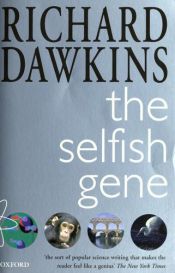Det egoistiske genet : med innledning av Dag O. Hessen
Blurb
Det egoistiske genet er den første og mest kjente boken til Richard Dawkins. Bokens første utgave kom i 1976; en utvidet, men ellers uendret utgave kom i 1989. Den norske oversettelsen ble utgitt i 2002. Boken presenterer forfatterens egoistiske-gen-teori, som i korte trekk går ut på at det er enklere å forklare evolusjon hvis man ser på gener – og ikke på organismer – som fokus for naturlig seleksjon.Boken vakte en del reaksjoner, delvis fordi den ble tolket som et forsvar for egoisme som menneskelig atferdstrekk på individnivå. Dette er imidlertid verken bokens eller forfatterens anliggende.
Det er også i denne boken at Dawkins innfører begrepet memer, «kulturelle gener», det vil si idéer som kan repliseres eller spres til nye «generasjoner» av «bærere», «dø ut» og mutere og endre seg over tid og dermed gjennomgå evolusjon.

 English
English Español
Español Deutsch
Deutsch










Member Reviews Write your own review
Box304
This book is well written and makes a lot of good arguments and scenarios. I do like the author and wanted to make that point before starting. However, this book falls short in many regards. The main problem is that arguments based off of fictitious numbers will always support he who made the argument in the first place (since he chose these fictitious numbers). Ultimately, these arguments are extremely poor unless one elaborates extensively on why the numbers were chosen (which the author here does not). Another issue which I have is that author takes a few jabs at Christianity over the translation of a few words (which is another extremely poor argument). Here is the problem: take a look at the book entitle "The Case for Christ" by Lee Strobel. If one were to attempt to make an argument against Christianity, one should attempt to refute the types of claims Lee makes in this book. You see in order for an argument to be effective one must make that argument at the underlying base as a whole in order to qualify the whole entire argument as ineffective. Attacking an argument not at the base, but at the "fingertips" with trying to attack translations (which are widely accepted as accurate) is an extremely poor argument. For instance, if I were to attack evolution (as being an origin of life theory), I would simply state that "Evolution" does not provide a rationality for how matter came into existence. This would be an argument at the base as to why "Evolution" (as an origin of life theory), is not a good theory at all (because at it's core does not explain anything at all or offer up any sort of explanation as to where matter came from). If I were to attack Islam, I would make remarks such as 1) Muhammad changed text in what was the Bible (which Revelations says not to do) 2) Muhammad claimed to be greater than Christ, who claimed to be equal with God 3) Muhammad led Holy Wars for personal gain (an attack on the prophets Character) 4) Muhammad married a wealthy widow (here seeking only personal gain) 5) Muhammad married many women (here seeking personal pleasure over the Lord) 6) Christ's followers claimed Christ resurrected from the dead, and Muhammad is still dead There are other arguments which can be made, I'm just making the point that these arguments are at the base of what the religion/theory is teaching, and that is how an effective argument is formed.
Be the first person to review
Shiitake
An important book on understanding altruism and how evolution could explain the continuing survival of altruism in the survival game.
Be the first person to review